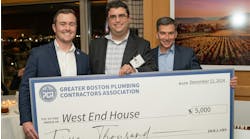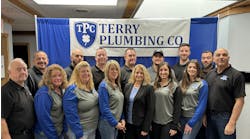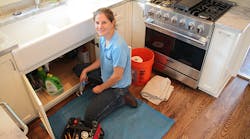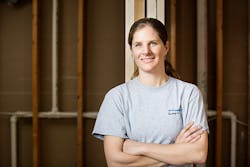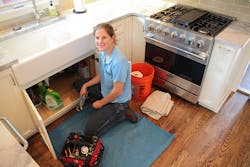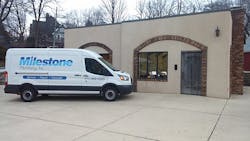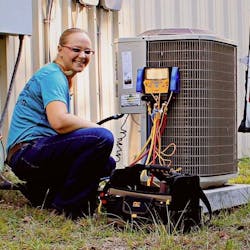Latest from Plumbing Contractor
Sponsored
Women in the plumbing & HVACR trades share their success stories
“Sisters are Doin’ it for Themselves” … “She Works Hard for the Money” … “It’s a Man’s World” … All these songs would make a great sound track for this feature article. As I continue my career here at Penton, CONTRACTOR’S parent company, I have more and more opportunities to talk with women working in all aspects of the trade, from women working at manufacturers and associations to distributors and wholesalers. I have written many articles about women in these sectors, but with this feature I decided to interview the women that are out in the field.
I interviewed five talented and personable ladies in the plumbing and HVACR trades to find out what lead them to having a career in the field, what they enjoy about their jobs, what challenges they face, and what the industry can do as a whole to recruit young people into the trades. I hope you enjoy reading this article as much as I enjoyed conducting the interviews.
Milestone Plumbing Inc.
Jessie Cannizzaro is owner and master plumber of Milestone Plumbing Inc., Wauwatosa, Wisconsin. Her career started at a very young age. Cannizzaro’s dad was a plumber and her mom helped him on the job and in the office too. It was just the two of them doing repair type work on older homes in Milwaukee. When Cannizzaro’s mom couldn’t help her dad, Cannizzaro was an extra set of hands. This is how she got her feet wet, so to speak, in the plumbing industry.
When you think about it what kid wants to do what their parent does? Usually kids don’t want to do what their parents do for a living,”—says Jessie Cannizzaro
“I’d be in charge of different tasks, and sometimes I would get rewarded for helping — maybe go out for ice cream or pick out a Nintendo game at Toys R Us,” says Cannizzaro. “But at the time I swore to people that I would never do this for the rest of my life, but it was OK for me to help once in a while. When you think about it what kid wants to do what their parent does? Usually kids don’t want to do what their parents do for a living.”
After high school, Cannizzaro worked in restaurants part-time while going to University of Wisconsin Milwaukee to study business. During this time her dad had a stroke and couldn’t work for a while. When he went back to limited work in the business, her mom decided to make a career change and go back to school for nursing (a nursing degree would allow her to get hired in the medical industry, ensuring they would have decent health care coverage).
“Since my mom was out of the family plumbing business I had the opportunity to leave the restaurant job and help my dad with the business on the days I was not attending classes,” says Cannizzaro. “After six months of doing this I figured if I was going to continue with the business I should take on an apprenticeship, so I would have a license.”
Cannizzaro is mechanical inclined, which she attributes to being exposed to plumbing when she was growing up.
My work ethic was driven into me by seeing my parents work hard. For this type of job, you need the stamina and drive within yourself,—says Jessie Cannizzaro
“I was exposed to this when I was a young kid — I was learning how to clean fittings and soldering at a young age,” says Cannizzaro. “It would be a lot harder trying to solder for the first time at the age of 35. Plus, my work ethic was driven into me by seeing my parents work hard. For this type of job, you need the stamina and drive within yourself. This is not an eight hour job — sometimes you are working 10 hours on a job.”
Cannizzaro loves the variety of work her job offers — no day is alike. “It’s rare to go to two jobs and do the same thing,” explains Cannizzaro. “You are always doing something different. The day goes by so fast, but this can be a curse too when you want more hours in a day. My mind is constantly challenged and I am very involved in what I am doing. I also love meeting the people. We have some awesome clients and I make so many connections too.”
Yet, Cannizzaro has come across some naysayers when she’s out in the field. One experience that she will always remember is when she went to a home to install two toilets, two sinks and to repair a hose bibb.
“This specific customer was probably in his 80s,” explains Cannizzaro. “I knocked on the door, he opened it, and I introduced myself. The look on his face when he saw me was of shock and caution. He didn’t trust me initially. As I worked, he followed me around. I remember him saying, ‘I’m going to watch you because I want to make sure you know what you are doing.’ He did eventually let me be, and I think he realized that I knew what I was doing.
“When I was done with the job I found out he was a woodworker — he had little angels that he carved out of wood — and he decided to give me one of the angels,” says Cannizzaro. “At the end of the day he gave me something he personally made. I felt that this meant I passed his test since he gave this to me.”
Being a woman in the plumbing field is a niche, according to Cannizzaro.
Being a woman plumber creates a buzz for us, and we get a ton of referrals because we are different,”—says Jessie Cannizzaro
“Female customers are always happy to see me,” says Cannizzaro. “A lot of moms on maternity leave request me to come out. They are comfortable with having a women plumber at the house.”
Being a niche in the industry is nice, yet it can be a double-edge sword too. With so many customer requests, Cannizzaro cannot possibly go to all of her customer’s service calls.
“Being a woman plumber creates a buzz for us, and we get a ton of referrals because we are different (right now there is not another female plumber at the company, the rest of the team are men), the customers ask for me a lot,” says Cannizzaro. “Normally I speak to a lot of the clients on the phone that I have a rapport with, so before sending a male plumber I will tell them how I know the plumbers I work with, and I give them some background on the plumber I am sending out. Once they know a bit about the plumber there is a comfort level.
HVACR Sisters
At Western Heating & Air Conditioning, Orem, Utah, Jessica Watts, maintenance technician, and Sharee Landers, system adviser, work in the field. Both ladies have interesting stories about what lead them to careers in the HVACR field.
Landers and her husband decided to take an online course about refrigeration together, and after that she decided to jump right into the industry and has not looked back — she has been working for Western Heating & Air Conditioning for four and a half years now.
Watts has been working for Western Heating & Air Conditioning for one year. She applied for a job at the company because it looked like a good opportunity and was something different for her to take on.
Communication is key — as long as we keep talking to the customer they will end up trusting us, and you have to be confident,”—says Sharee Landers
Landers and Watts both enjoy the customer service aspect of their jobs.
“I love meeting customers and helping them fix a problem,” says Landers.
“I like that I get to continually learn,” says Watts. “Plus, no job is ever the same. I never get bored with this job.”
According to Landers, one of the challenges of the job is to overcome naysayers.
“You have to stay calm and friendly,” explains Landers. “Communication is key — as long as we keep talking to the customer they will end up trusting us, and you have to be confident. Confidence is big and a customer can sense when you are not confident, so you need to walk in with confidence, and do the best job and then you gain that customer and their trust.”
When going on a service call, customers are either happy to see a female technician or they are taken back.
“Customers are always surprised when they open the door and see me,” explains Landers. “This happens every day. Some customers are happy to see a woman tech while some customers you have to prove yourself to.”
Two other ladies — Amy Clayton, HVAC tech, Georgia state HVAC license, and Amanda Chaney, HVAC tech — working at AC Service Center, Kingsland, Georgia, have interesting backgrounds and reasons for going into the trades.
When Chaney joined the Army she decided to work as a vehicle mechanic, even though the army recruiter had doubts about her going this route.
“I noticed that the vehicle mechanic position had a big sign-on bonus because mechanics were desperately needed, but then he [Army recruiter] insinuated that it was hard work, and I might not be suited for it. But that is what I decided I wanted to do. I decided to be a mechanic for the Army for six years and I loved it.”
After the Army Chaney was a stay-at-home mom for a while, and once her girls were older she decided to go back to work and do sometime similar to what she was doing in the Army.
“Sharon offered me a job here, and the rest is history and I really love it,” said Chaney.
For Clayton, her exposure to all-things mechanical started at a young age — she grew up with her dad in the mechanical field.
“I have always known a regular job was not for me,” says Clayton. “I wanted a job in which I could work with my hands. I’ve been with AC Service for about five years now. Before I was a contractor I worked on rehabbing houses, plus I continue to build race cars with my husband.”
Chaney loves the challenge of her job. “I learn something new every day, troubleshooting, fixing things… There is a great deal of pride and satisfaction in that. When you leave the customer’s home you have a good feeling that you helped them. You fixed there problem — it is a good feeling. “
It's not a job to me, it's a mission — a mission to help as many people not get taken advantage of by untrained service technicians in our field,”—says Amy Clayton
Also, Clayton enjoys helping people make choices and creating relationships with them.
“I enjoy offering customers honest and accurate repairs,” says Clayton. “The work comes natural to me, and I am extremely passionate about my career. It's not a job to me, it's a mission — a mission to help as many people not get taken advantage of by untrained service technicians in our field. I never stop studying up on upcoming trends to our market. I keep myself ahead of the game. This allows me to pass information on to all of our techs and make our company excel above the rest.”
Challenges overcome
Regarding challenges, Chaney says that her mechanical background has really helped her out a lot, and the only issue she has had is the naysayers that think she is not capable.
Clayton points out that one of the difficulties is being accepted by other field technicians.
“Some of the male field technicians don’t accept women, but you learn to ignore this and be confident,” says Clayton. “And you need to remember that you are probably a better technician at the end of the day. One obstacle I come across is having men employees work under me and train under me. In their minds I am still ‘the girl.’ But I know that they get more detailed training from me because by nature women are more detailed. This allows trainees to come away as a more detailed oriented technician.”
According to Chaney, there will always be some naysayers, but overall customers are happy to see a woman technician come to the rescue.
“Two weeks ago I went on a service call to do a cleaning and we went to the house and a lady opened the door and she was very excited to see us,” said Chaney. “We have a lot of customers that request us because they feel comfortable with us. There are a lot of different positives to having a female technician on staff. Often when a woman customer opens their door and sees me, I see a wave of relief come over her face.”
The fine details
All the women interviewed for this article have an eye for detail, plus are good organizers. For example, Cannizzaro is focused on details and organization, so much so, that they are part of her company’s culture.
Cannizzaro also believes that women have an advantage because of having a smaller body frame. “I can get into tiny places and work easier in them than a man with a bigger frame.”
However, Cannizzaro admits that body size can be a detriment too because women often do not have the same physical strength as men.
“A man twice my size would be able to get a water heater in and out of a basement easier than me,” says Cannizzaro “However with regards to tools it’s not about strength, but about the proper way to use a tool. Strength doesn’t matter, but how you hold and use the tool does.”
According to Landers, there are so many positive attributes women inherently have to make them successful in the field. For example, communication is very important, and many women are great communicators. By talking with your customer you get to know them, and this allows them to drop their guard — the customer becomes comfortable with the technician.
“Most of our customers are women at home, so we can connect with them and they are comfortable with us, and this builds trust,” explains Watts.
“I’ve had comments from our customers, thanking me for hiring women to do this job,” said Angie Snow, vice president of Western Heating and Air Conditioning. “Customers feel very comfortable with them and they do a great job on maintenance. Customers really appreciate that I have female technicians.”
According to Clayton, in the community there is a buzz about AC Service Center having women technicians.
“People won't forget having a woman fix their air and will talk about the unordinary experience of having a women tech, which drives business our way,” says Clayton. “I also can vouch that customers both women and men create a stronger relationship with women technicians because we are more personal. Not just about the equipment but about their kids, pets, etc.”
According to Chaney, people tend to talk to us more, which develops a relationship with the customer. I found this leads to more repeat business.
“We care about what is going on with the customer,” says Chaney. “Because we are a minority we tend to stand out more to customers since we are women.”
According to Sharon Davis, president/owner of AC Service, many women grow up intending to be caregivers, and in a sense, women in the trades are caregivers.
“I think it’s natural for women to address problems and give suggestions to fix problems,” said Davis. “I believe that when there is a woman on the install team, it keeps the team together — we are more organized, have attention to detail, etc. Me, Amy and Amanda are very detailed oriented — we want to make sure everything is just right. We pay attention to the details and make sure our customers are happy.”
Candace Roulo
Candace Roulo, senior editor of CONTRACTOR and graduate of Michigan State University’s College of Communication Arts & Sciences, has 15 years of industry experience in the media and construction industries. She covers a variety of mechanical contracting topics, from sustainable construction practices and policy issues affecting contractors to continuing education for industry professionals and the best business practices that contractors can implement to run successful businesses.
